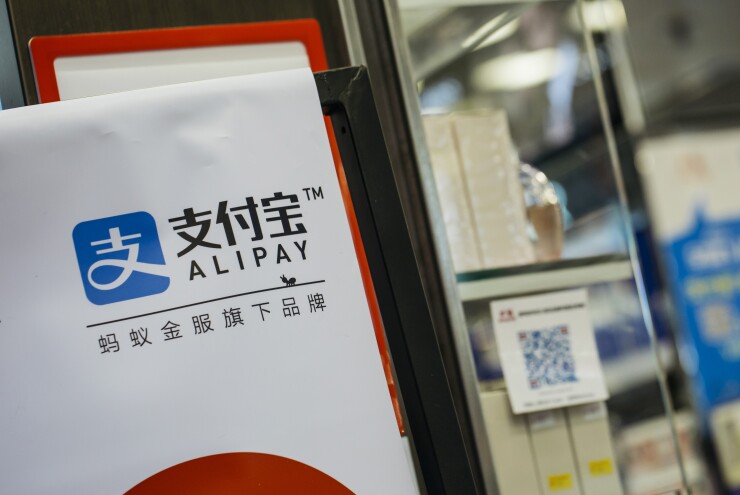Welcome to the PaymentsSource Morning Briefing, delivered daily. The information you need to start your day, including top headlines from PaymentsSource and around the Web:
Word of Mouth: Alipay's restaurant review feature, Koubei, deployed its standalone app as it attempts to compete in China's growing online-to-offline market, which totals hundreds of billions of dollars yearly, reports

Blockchain car: IBM, UBS and car parts seller ZF are collaborating on a blockchain payment system that can be used inside moving cars,
Who is it? A group of Belgian companies is
Nets expands P-to-P: Nets, a payments processor in the Nordic region, has added mobile payments company Vipps to its peer transfer service, a move that will add more than 100 banks to Nets' network. The companies announced the collaboration, along with the region's move to faster payments, will support real-time transfers for consumers in most of of the market. Both Nets and Vipps are adjusting their systems to accommodate the partnership, with real-time payments expected to go live at some banks by the end of the year.
From the Web
TechCrunch | Tue Sep 12, 2017 - Marketplace banking — the idea that your bank will provide you with access to various third-party money-related apps and services within its own app — has long been championed by fintech startups, whilst upcoming Open Banking/PSD2 legislation in the U.K. and EU, respectively, will make third-party app integration an inevitable reality. That’s seeing a number of challenger banks skating to where the puck is going, including London-based Starling Bank, which today is launching the Starling Marketplace. Billed by the digital-only challenger bank as a new concept in banking, the Starling Marketplace puts products from other fintech providers (and in the future “lifestyle products,” because nearly every business is going to be tempted to jump onboard the Open Banking train) within “an easily browsed ecosystem” accessible within the Starling app.
TechCrunch | Tue Sep 12, 2017 - China’s decision to freeze fundraising through initial coin offerings continues to roil markets, but the regulatory decision may not be as controversial as the response from the bitcoin community would lead observers to believe. On Monday, the People’s Bank of China announced that it was implementing a freeze on fundraising through ICO’s on Chinese exchanges. The move by China’s central bank, which is roughly equivalent to the Fed in the US, looks at first blush to be a blunt response to a nuanced issue. Many in the US have chided the PBOC for its apparent overreaction. AngelList co-founder Naval Ravikant called the policy a “huge gift to Silicon Valley and its resident financiers.” VC Fred Wilson penned a thoughtful post comparing China’s approach to that of the SEC in the US, opining that “We needed a cooling off period and if China’s actions are that cooling off period, then I welcome them. However, a blanket ban on ICOs seems like bad policy to me.”
Fox | Tue Sep 12, 2017 - The Ohio Lottery will soon begin accepting cashless payments at its self-service vending machines as it moves toward accepting credit, debit and e-wallet payments for all lottery purchases. Last week, technicians began retrofitting 6,000 self-service machines at retailers statewide. They will accept cash and non-cash payments beginning October 29, according to an Ohio Lottery spokesperson. “It's a changing consumer trend. More and more consumers aren't carrying cash,” Ohio Lottery Communications Director Danielle Frizzi-Babb said. “It's really a way of adapting to consumer trends and the way that consumers are behaving.” Currently, retailers can choose whether or not to accept credit or debit cards for behind-the-counter purchases. Phase two of the lottery’s $1 million process next summer will involve the replacement of behind-the-counter terminals, so all lottery purchases at all retailers can be cashless.
More from PaymentsSource
While the EMV fraud liability shift for most companies passed nearly two years ago, there are still pockets of stores that haven't switched over — and they can be particularly prone to the kind of fraud chip cards are designed to thwart.
The massive Equifax breach has captured the headlines for days, and for good reason.
Apple's upcoming iPhone X will ditch its fingerprint sensor in favor of a multi-camera system, but it still expects some users to opt for a PIN code.
The Equifax data breach is likely to have permanent repercussions not just for the company, but for any business that relies on credit scoring.





